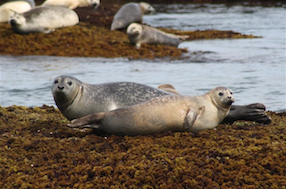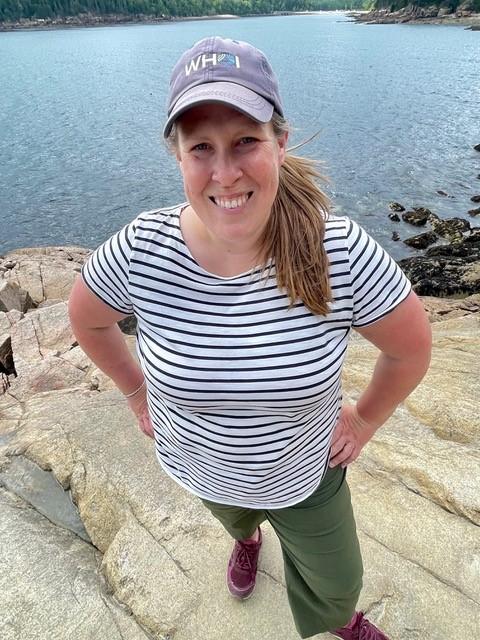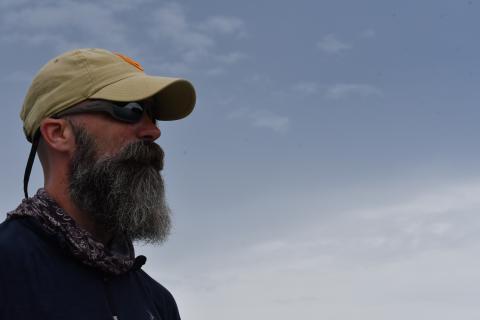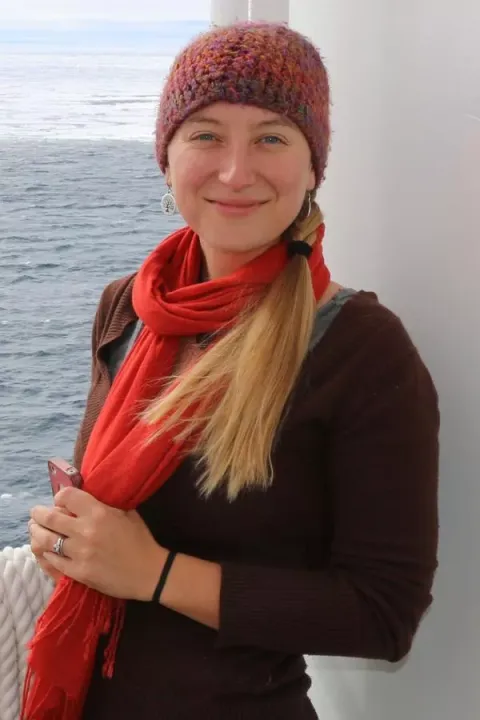Course Dates
- Marine Mammal Biology - section A: June 1, 2026 to June 15, 2026
- Marine Mammal Biology - section B: June 15, 2026 to June 29, 2026
This course is being offered twice this summer. Section B is a repeat of Section A and contains the same content.
Prerequisites
One semester of college-level biology or equivalent; background in vertebrate biology is recommended, but not required.
Equivalent Note
Cornell students: This course fulfills a CALS graduation requirement.
Course Description

Harbor seals at neighboring Duck Island.
Introduction to the biology and conservation of the whales and seals, with a particular focus on species of the Gulf of Maine. Lectures examine topics including taxonomy and species diversity, adaptations for life in the sea, foraging ecology and behavior, reproductive cycles, bioacoustics, and management of threatened species. Land and open-water observations of whale and seal behavior are an integral part of this course. Instructors are permitted to conduct dissections of marine mammals when carcasses are available for autopsy.
Some of the learning outcomes for this course include:
- Identify and explain the morphological, physiological adaptations specific to the evolution of marine mammals;
- Understand the seasonal patterns of foraging and reproductive cycles of local marine mammals and their relation to resource availability in the Gulf of Maine;
- Recognize the anthropogenic threats faced by marine mammals and the challenges to their long-term conservation and management.
Internship opportunity: This course is recommended experience for SML's Marine Mammal Internship.
"...after attending the Shoals course for Marine Mammals...I was able to learn about something that really interested me, and I am one step closer to my dream of working with and helping marine mammals." - Lindsay Spotts (SML '15, UNH '18)
Course Numbers
Cornell: BIOSM 3450 (3 Credits)
UNH: MEFB 535 (4 Credits)
Faculty (sections A)
Dr. Nadine Lysiak

Nadine is a Research Scientist at the Anderson Cabot Center for Ocean Life at the New England Aquarium and a member of the Faculty at the Shoals Marine Lab where she teach courses on ecology, evolution, and marine mammal science. Nadine conducts research on large whale foraging ecology, stress and reproductive physiology, and migration behavior. Her research focuses on retrospective chemical analysis of baleen.
Dr. Matt Leslie

Matt Leslie joined the faculty of the Biology Department at Ursinus College in 2022. He has also been a researcher and board member of Panacetacea, a non-profit cetacean research and conservation organization based in Panama, for nine years. Dr. Leslie's research examines the evolution, population biology, ecology, and taxonomy of cetaceans using a range of techniques, from genetics and morphology to tagging and drones. This work helps inform our categorization of cetacean diversity, identify populations for conservation and management of threatened and endangered species, and understand how cetaceans interact with their environment. He has 25 years of experience in cetacean field and laboratory studies, and has been teaching classes in undergraduate marine science since 2014.
Faculty (section B)
Dr. Michelle Fournet

Dr. Michelle Fournet (she/her) is an acoustic ecologist who uses sound to investigate the interactions between marine organisms and human activities. This includes:
– Investigating how marine organisms use sound to facilitate vital life functions (animal communication);
– Investigating the potential impact of anthropogenic noise and climate change on marine species and environments (anthropogenic impacts), and
– Investigating how sound can be used as an indicator of ecosystem health (acoustic indicators).
In 2013, BioSM 1650 participated in the salvage of a minke whale carcass.
Stories and photos the 2013 BioSM 1650 minke whale adventure:
